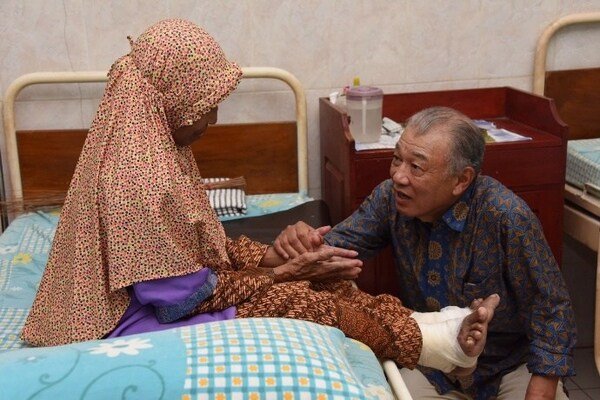Sasakawa Leprosy Initiative Strengthens Support for Indonesia on World Leprosy Day 2025
27 January 2025 | Monday | News

Yohei Sasakawa visiting a patient at Sumberglagah Hospital, Mojokerto Regency, East Java
On the occasion of World Leprosy Day 2025 on January 26, WHO Goodwill Ambassador for Leprosy Elimination Yohei Sasakawa announces that the Sasakawa Leprosy Initiative (SLI) will increase its support to Indonesia to combat the stigma and discrimination associated with leprosy and to promote early diagnosis and treatment of the disease.
Leprosy, also known as Hansen's disease, is an infectious disease caused by the bacterium Mycobacterium leprae that mainly affects the skin and peripheral nerves. For much of its long history, the cause was unknown, giving rise to many myths and misconceptions.
Since the introduction of WHO-recommended multidrug therapy (MDT) in 1981, some 18 million people worldwide have been cured of leprosy. However, around 200,000 new cases are reported each year, and many people affected by leprosy and their families continue to face rejection based on outdated stereotypes and superstitions.
After India and Brazil, Indonesia has the third highest number of cases of leprosy in the world. In 2023, it recorded 14,376 new cases, including 1,179 children. In addition, 826 people, including 21 children, had visible disabilities at the time of diagnosis, indicating that they were diagnosed late.
"Indonesia is one of the most important countries in the fight against leprosy," said Sasakawa. "Overcoming stigma and discrimination and promoting early diagnosis and treatment there will be key to accelerating the world's progress toward zero leprosy."
He said that from this year, SLI will intensify its support for Indonesia, working with government agencies, civil society organizations, research institutes, the media and others to raise awareness of leprosy and encourage people to seek treatment if they suspect they have the disease.
SLI already supports the Indonesian Ministry of Health's national leprosy program through the WHO, as well as providing assistance to NGOs and PerMaTa, an organization of persons affected by leprosy.
"Leprosy is a treatable disease. With appropriate and timely treatment, disabilities associated with leprosy can be prevented," said Al Kadri, PerMaTa's chairman. "But fear of prejudice and discrimination means that many people go undiagnosed and untreated."
Indonesia has a comprehensive strategy to tackle leprosy, according to Health Minister Budi Gunadi Sadikin, including public education campaigns, collaboration with tuberculosis initiatives to strengthen case detection and treatment, and support for social rehabilitation. "Through these measures, we aim to achieve a leprosy-free Indonesia, where everyone can live with dignity," he said.
As part of its support for Indonesia's efforts against the disease, SLI plans to identify several districts and work with local government agencies, healthcare providers and others to develop "zero leprosy" projects that can serve as models for the whole country.
Most Read
- How Does GLP-1 Work?
- Innovations In Magnetic Resonance Imaging Introduced By United Imaging
- Management of Relapsed/Refractory Multiple Myeloma
- 2025 Drug Approvals, Decoded: What Every Biopharma Leader Needs to Know
- BioPharma Manufacturing Resilience: Lessons From Capacity Expansion and Supply Chain Resets from 2025
- APAC Biopharma Review 2025: Innovation, Investment, and Influence on the Global Stage
- Top 25 Biotech Innovations Redefining Health And Planet In 2025
- The New AI Gold Rush: Western Pharma’s Billion-Dollar Bet on Chinese Biotech
- Single-Use Systems Are Rewiring Biopharma Manufacturing
- The State of Biotech and Life Science Jobs in Asia Pacific – 2025
- Asia-Pacific Leads the Charge: Latest Global BioSupplier Technologies of 2025
- Invisible Threats, Visible Risks: How the Nitrosamine Crisis Reshaped Asia’s Pharmaceutical Quality Landscape
Bio Jobs
- Sanofi Turns The Page As Belén Garijo Steps In And Paul Hudson Steps Out
- Global Survey Reveals Nearly 40% of Employees Facing Fertility Challenges Consider Leaving Their Jobs
- BioMed X and AbbVie Begin Global Search for Bold Neuroscience Talent To Decode the Biology of Anhedonia
- Thermo Fisher Expands Bengaluru R&D Centre to Advance Antibody Innovation and Strengthen India’s Life Sciences Ecosystem
- Accord Plasma (Intas Group) Acquires Prothya Biosolutions to Expand Global Plasma Capabilities
- ACG Announces $200 Million Investment to Establish First U.S. Capsule Manufacturing Facility in Atlanta
- AstraZeneca Invests $4.5 Billion to Build Advanced Manufacturing Facility in Virginia, Expanding U.S. Medicine Production
News











